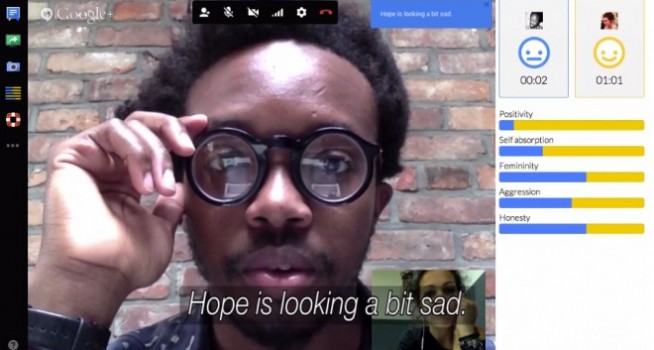Via Wired.com
Technology has made it easier than ever to stay in touch. But services like Skype and FaceTime don’t necessarily guarantee a good conversation. They provide a virtual venue; the rest is up to us. You can imagine a point where our apps do take that next step, though: nudging us when it’s our turn to talk; making sure we say the right thing; and reminding us to shut up when it’s time to listen. With US+, a new app for Google Hangout, you can get a taste of that future.
The app was created by artists Lauren McCarthy and Kyle McDonald. Combining some rough linguistic and facial expression analysis, US+ monitors video chats in real time. You can see how hostile you’re being; how positive; or how honest. At certain intervals, the application will give you suggestions, telling you you’re talking too much or noting that your interlocutor looks sad.
Both artists see something like US+ as an inevitability, but at this point, the software is more about exploring the idea of algorithmic mediation than actually mediating conversation in a significant way. “While this app really works, I’m doubtful that any of the things it’s recognizing are things that someone with 10 minutes of training couldn’t identify faster than the computer,” McDonald says.
“The tongue in cheek portion is the idea that maybe we won’t have the option to ignore these suggestions at some point,” he adds. “Either the system will be so accurate that we can’t afford to ignore it, or it’s so ingrained in the way we interact that we feel uncomfortable living without it.” Think of it as your smartphone’s autocorrect with Skynet-level smarts.
In either case, putting it out there in this rough form at least gives us a chance to think about the implications. “Hopefully if we experiment enough, early on, we can retain the critical perspective we have before it’s impossibly prevalent,” he says.
Recently, McDonald and McCarthy co-taught a course called “Appropriating Interaction Technologies” for NYU’s ITP program. The catchier name for it was “social hacking,” with students dreaming up clever ways to interrupt the digital routines and commonplace technologies we rely on every day.
One student asked strangers on the street to borrow their phones, only to snap a picture of their browsing history. Another asked friends to help him figure out where to buy a coffee, using only a virtual Street View-style interface.
At some point, McCarthy says, the group’s discussion turned to why. “After the students had gone out and created mayhem by introducing small ‘social glitches,’ everyone started asking why are we doing this, is it just to make people uncomfortable or is there a deeper point?,” McCarthy recalls. But in those cases—and with US+—she finds that the disruptions can offer a different perspective on the relationships we have with technology and each other.
“With the current pace of tech development and startup culture, there’s not a lot of time for contemplation in the process,” she says. “I think as artists we can contribute to the conversation by provoking people to engage with questions about what kind of social future we’re building.”
http://www.wired.com/design/2014/01/become-a-video-chat-master-with-this-word-analyizing-face-tracking-app/?c>













